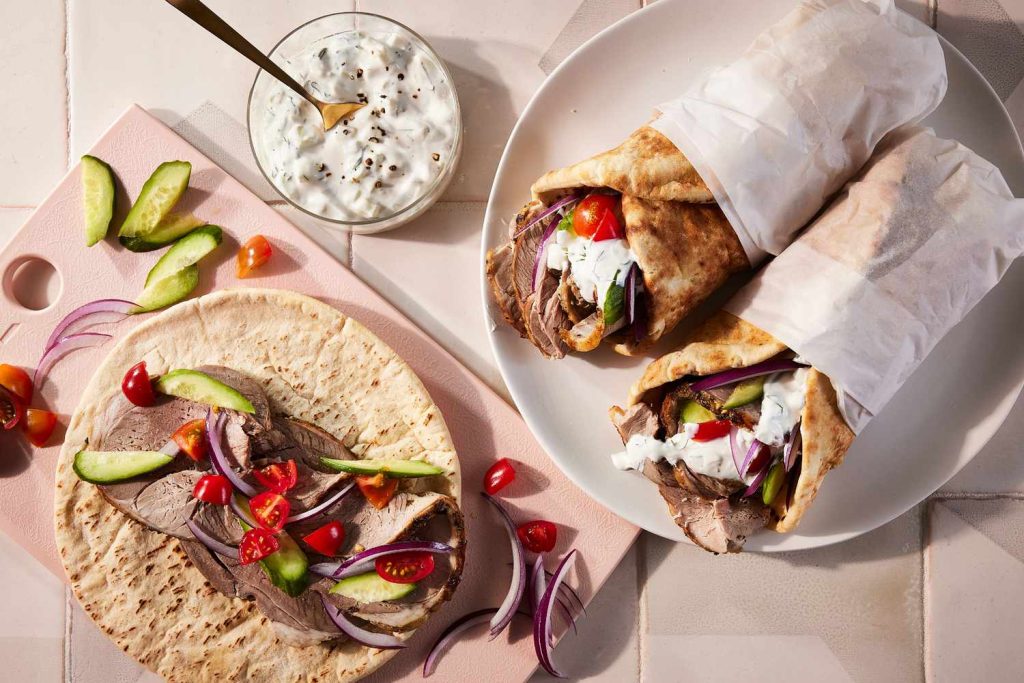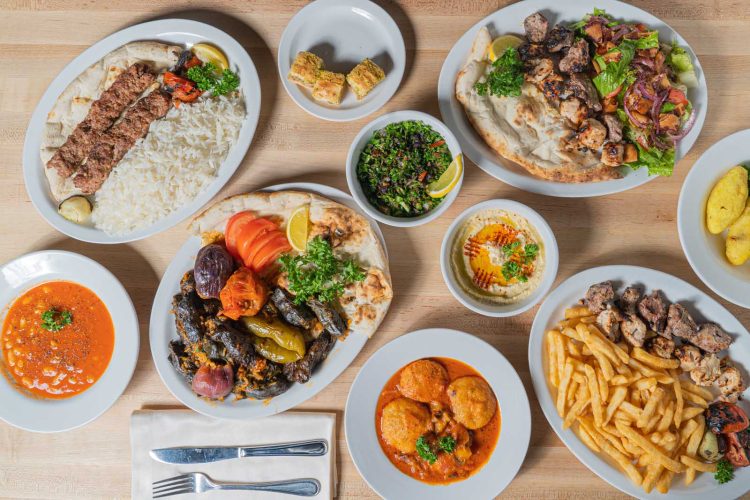Mediterranean cuisine is renowned for its vibrant flavors, fresh ingredients, and healthful qualities. Spanning across several countries, including Spain, Italy, Greece, Turkey, and Morocco, Mediterranean food reflects the diversity of the region, where tradition and innovation merge seamlessly on the plate. Whether it’s the rich olive oils, succulent seafood, or tangy cheeses, the Mediterranean diet offers an unforgettable culinary experience that’s as much about culture as it is about taste. In this article, we’ll explore the essence of Mediterranean cuisine, from its iconic dishes to the best destinations for a culinary adventure, so you can indulge in the very best this region has to offer.
1. The Essence of Mediterranean Cuisine
Mediterranean cuisine is characterized by an emphasis on fresh, seasonal ingredients and balanced flavors. The diet is based on plant-based foods, healthy fats like olive oil, fresh herbs, and lean proteins, particularly fish and legumes. This approach to eating has long been considered one of the healthiest in the world due to its emphasis on nutritious foods like fruits, vegetables, nuts, whole grains, and fish.
Key Ingredients in Mediterranean Cuisine
- Olive Oil: Olive oil is the cornerstone of Mediterranean cooking. Used in everything from salads to cooking and drizzling over finished dishes, its rich, fruity flavor adds depth to dishes.
- Fresh Herbs: Basil, oregano, thyme, rosemary, and parsley are commonly used in Mediterranean cooking, infusing dishes with aromatic flavors.
- Seafood: Given the region’s coastal geography, seafood is a staple in Mediterranean dishes, with fish, octopus, and shellfish appearing frequently in meals.
- Cheese: Mediterranean cheeses, such as feta from Greece, mozzarella from Italy, and manchego from Spain, play a central role in regional cooking.
- Citrus Fruits: Lemons and oranges are widely used in Mediterranean cuisine, whether for zest, juice, or garnish.
2. Iconic Mediterranean Dishes to Try
Mediterranean cuisine offers a diverse array of dishes, each bringing its own regional flair and taste. From rich, savory stews to light, refreshing salads, the flavors of the Mediterranean vary but are consistently delicious.
Paella (Spain)
Paella is a beloved Spanish dish originating from Valencia. It’s a hearty rice dish that combines seafood, chicken, and vegetables, all simmered together with saffron and other aromatic spices. The combination of flavors and textures is what makes paella a standout dish in Mediterranean cuisine.
Moussaka (Greece)
Moussaka is a traditional Greek casserole made of layers of eggplant, minced lamb or beef, and béchamel sauce. It’s baked until golden and is often enjoyed as a comfort food during gatherings and special occasions.
Frittata (Italy)
An Italian classic, frittata is an egg-based dish similar to an omelette or crustless quiche. It’s packed with vegetables, cheeses, and sometimes meats like sausage or bacon. Frittata is versatile and can be enjoyed hot or cold.
Tabbouleh (Lebanon)
Tabbouleh is a refreshing salad that hails from Lebanon. Made from bulgur wheat, parsley, tomatoes, onions, and a tangy lemon dressing, this dish is light, healthy, and bursting with fresh flavors.
Couscous (Morocco)
Couscous is a traditional North African dish made from steamed semolina wheat. Often served with lamb, chicken, or vegetables, it’s commonly accompanied by a flavorful broth or stew. The dish is rich in flavor and widely adored across Mediterranean and Middle Eastern cultures.
Baba Ganoush (Lebanon/Syria)
Baba Ganoush is a smoky eggplant dip made by roasting eggplants and blending them with tahini, garlic, lemon juice, and olive oil. This dish is perfect as a mezze appetizer, often enjoyed with pita bread or fresh vegetables.
3. Mediterranean Food Culture: Dining Together
In the Mediterranean, food is more than just sustenance—it’s about bringing people together. Meals are often a social event, where families and friends gather to enjoy food, share stories, and celebrate life. The Mediterranean lifestyle emphasizes slow, mindful eating, and it’s common for meals to last several hours.
Mezze (Middle Eastern Mediterranean)
Mezze refers to a spread of small dishes served together as appetizers or a light meal. The selection often includes dips like hummus and baba ganoush, grilled meats, olives, and stuffed grape leaves. Mezze is a social way of eating, designed to encourage sharing and conversation.
Sundays in Italy: La Grande Famiglia
In Italy, Sundays are for family. The tradition of enjoying a leisurely meal together is deeply ingrained in the culture. Families gather around the table to share multiple courses, often starting with antipasti (appetizers), followed by pasta or risotto, a main meat dish, and finishing with a sweet dessert like tiramisu or panna cotta.
Tapas (Spain)
In Spain, tapas are small appetizers or snacks served with drinks. They range from simple olives and nuts to more elaborate dishes like patatas bravas (fried potatoes with spicy tomato sauce) and gambas al ajillo (garlic shrimp). Tapas are perfect for sharing with friends over a glass of wine, making them a key part of Spanish social culture.

4. Mediterranean Wine and Pairings
Mediterranean cuisine is inextricably linked to wine, as many regions of the Mediterranean are famous for their wine production. The warm climate and rich soil contribute to the cultivation of exceptional grapes, and wine is often paired with meals to enhance the overall dining experience.
Spanish Wine: Tempranillo and Albariño
Tempranillo, Spain’s flagship red wine, pairs beautifully with dishes like paella or grilled meats. Albariño, a crisp white wine from the coastal regions of Spain, complements seafood dishes and tapas perfectly.
Italian Wine: Chianti and Prosecco
Italy is home to many world-renowned wines, and no meal would be complete without a glass of Chianti alongside a pasta dish. Prosecco, Italy’s sparkling wine, is perfect for light appetizers or seafood.
Greek Wine: Assyrtiko
Assyrtiko is a white wine native to the island of Santorini, Greece. It pairs wonderfully with Greek seafood dishes like grilled fish or moussaka, offering a refreshing contrast to the richness of the food.
5. Best Mediterranean Destinations for a Culinary Journey
If you’re a foodie eager to explore Mediterranean cuisine firsthand, certain destinations are particularly renowned for their culinary offerings. Whether you’re savoring a freshly made pizza in Naples or sampling the freshest seafood in Barcelona, these cities offer some of the best Mediterranean dining experiences.
Barcelona, Spain
Barcelona is a haven for lovers of Mediterranean cuisine, particularly seafood. From the bustling La Boqueria market to the many tapas bars scattered across the city, Barcelona is a food lover’s paradise. Don’t miss the chance to try traditional Catalan dishes like escalivada (roasted vegetables) or crema catalana (a custard dessert similar to crème brûlée).
Naples, Italy
Known as the birthplace of pizza, Naples is a must-visit for any lover of Italian cuisine. The city is famous for its Margherita pizza made with fresh mozzarella and tomato sauce, baked in a wood-fired oven. Alongside pizza, try spaghetti alle vongole (spaghetti with clams) and sfogliatella, a pastry filled with ricotta and orange zest.
Athens, Greece
Athens is brimming with opportunities to enjoy authentic Greek dishes. From souvlaki and gyros (grilled meat on pita) to saganaki (fried cheese) and baklava, Athens’ street food culture is a must-try. Pair your meal with a glass of ouzo, a popular Greek spirit.
Marrakech, Morocco
Marrakech is the heart of Moroccan cuisine, where the spices and flavors of the Mediterranean and Middle East meet. Here, you can explore vibrant markets and indulge in traditional dishes like tagine (slow-cooked stew) and couscous, and sip mint tea in the beautiful Riads.
6. Mediterranean Culinary Health Benefits
Beyond its delicious flavors, Mediterranean cuisine is known for its health benefits. The Mediterranean diet is rich in antioxidants, healthy fats, and fiber, contributing to heart health, improved digestion, and longevity.
Health Benefits of the Mediterranean Diet
- Heart Health: The Mediterranean diet is rich in unsaturated fats from olive oil and nuts, which can help reduce cholesterol levels and lower the risk of heart disease.
- Weight Management: The diet focuses on portion control and emphasizes vegetables, legumes, and whole grains, helping maintain a healthy weight.
- Brain Health: Consuming omega-3-rich fish, like salmon, can improve cognitive function and protect against Alzheimer’s disease.
Conclusion: The Mediterranean Way of Eating
Mediterranean cuisine is a celebration of fresh, seasonal ingredients and rich cultural traditions. With its emphasis on simple, healthy foods, it offers a culinary experience that not only delights the senses but also promotes well-being. Whether you’re exploring the bustling markets of Morocco or enjoying a leisurely meal in the heart of Italy, indulging in Mediterranean cuisine is an unforgettable journey through the tastes and flavors of the Mediterranean region. Bon appétit!





















